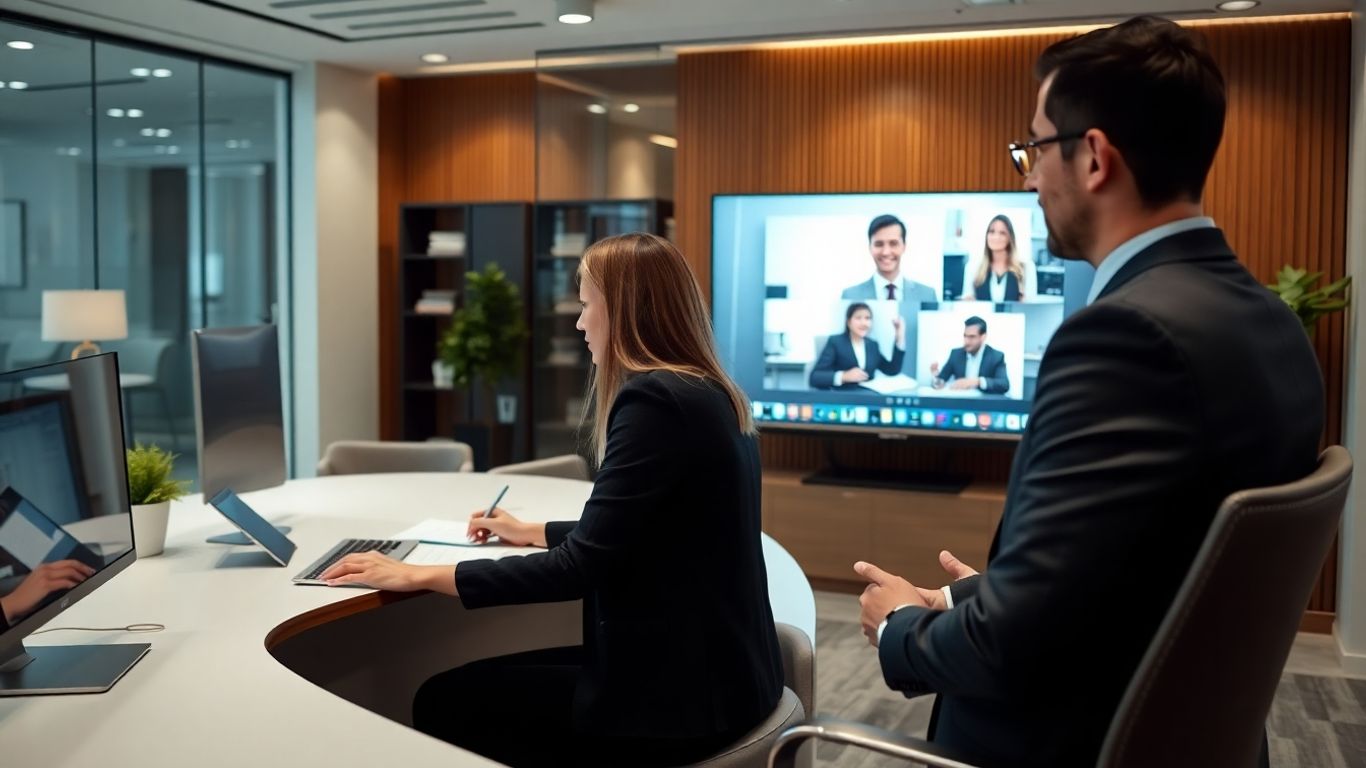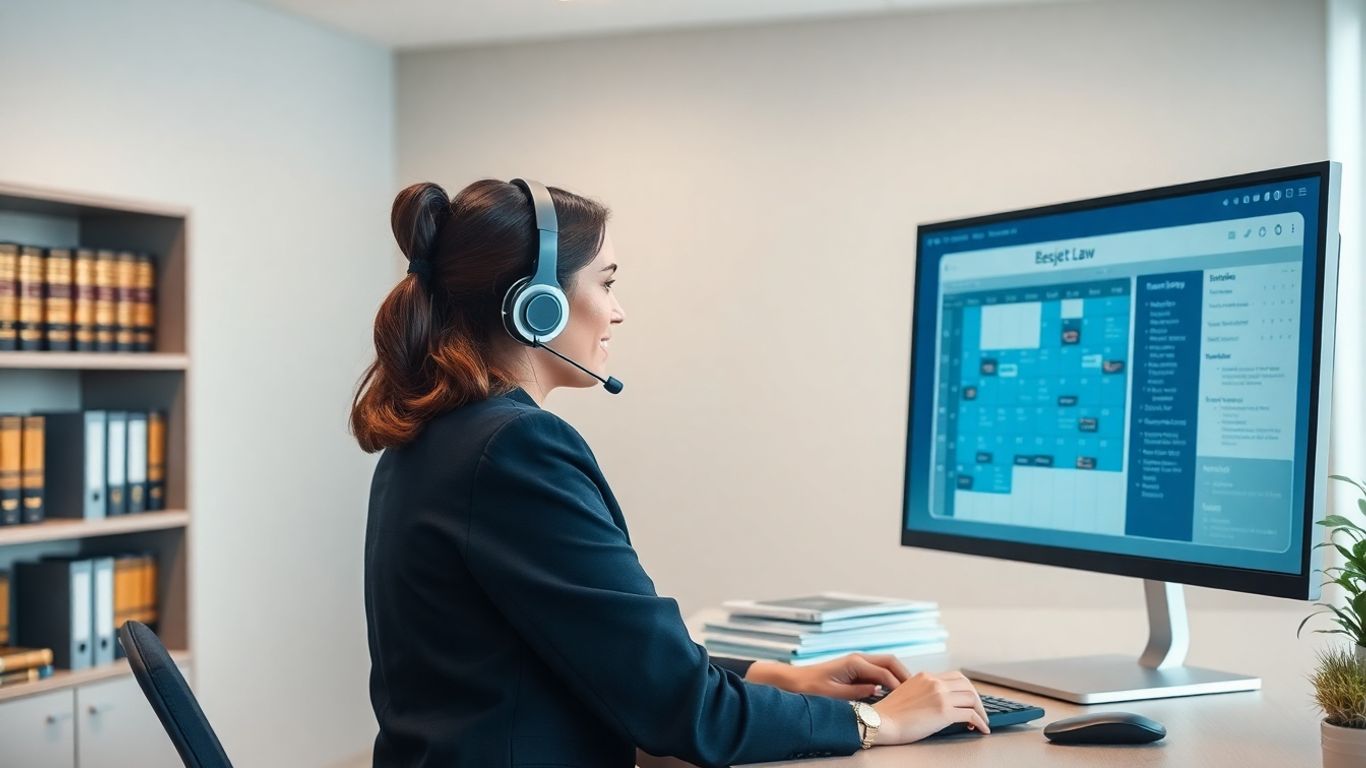Running a law firm in 2025 is no walk in the park. Between court dates, client meetings, and mountains of paperwork, it’s easy to feel stretched thin. The phone never stops ringing, and every missed call could be a missed opportunity. That’s where an attorney virtual receptionist service steps in. Instead of juggling calls and appointments yourself, you get a dedicated team (or AI) to handle the front desk, all without hiring more in-house staff. It’s a simple fix that can make your practice run smoother, help you catch more leads, and free up your time for the work that really matters.

Hiring an attorney virtual receptionist isn’t just a convenient fix for missed calls—it's a real way to keep your law firm running more smoothly without feeling overworked every week.
The difference with dedicated legal virtual receptionists is that they double as both front-line client managers and behind-the-scenes organizers.
Here's a quick look at how their daily tasks compare to traditional in-house reception:
When your law firm is swamped, delegating the first layer of communication to a skilled remote receptionist takes pressure off your legal staff and keeps your operation running without a hitch. You can finally focus on the work that actually generates revenue instead of endless interruptions.
Bringing new clients into a law firm isn't just about answering phones. It's a string of important steps, and, honestly, it can eat up a ton of time if you don't have a system in place. Attorney virtual receptionist services step in to make this less of a headache and more of a well-oiled process, from the first call all the way to the initial consult.
A virtual receptionist service makes welcoming new clients way smoother and less stressful for your team. When someone reaches out, they’re probably anxious or unsure, and having a real person (or a smart AI trained for legal intake) who responds instantly can make all the difference. These services can:
The client journey starts at the very first point of contact. If that step is handled quickly and kindly, it sets a good tone for everything that follows.
Not every caller is the right fit for your practice, and sorting that out efficiently makes a huge difference. Virtual receptionists follow your particular checklist or script, asking the right questions to:
Here's a quick breakdown of a typical lead qualification call:
Missed calls mean missed clients, especially in law where people tend to call during a crisis. Virtual receptionist services answer instantly—even outside normal business hours. If your line rings, it gets picked up, every single time. These systems offer:
They can also provide real-time dashboards and call reporting (a feature popular in resellable AI receptionist services), helping you track:
In short: Outsourcing your intake can mean the difference between a potential client choosing your firm—or calling the next firm listed in Google. For law firms that want to grow, tightening up the intake process is a must.

Law firms are often buried in phone calls, appointments, and endless interruptions. Outsourced receptionist services are changing that for attorneys everywhere. For a lot of small or midsize practices, these services have become the difference between barely keeping up and actually growing the practice.
A big headache for many attorneys is juggling legal work with admin tasks that never seem to end. Phone calls, scheduling, and basic intake can eat up hours that should really go toward client work. Handing these tasks off to a virtual receptionist isn’t just convenient—it’s a smart business move. Here’s what typically gets shifted off your team’s plate:
When these basic chores get taken care of, your legal team is able to channel their focus into work that actually demands their training and experience.
Constant interruptions are bad for productivity. Every time the phone rings or a team member stops to check a voicemail, it breaks focus and makes it harder to complete billable work. A dedicated virtual receptionist means lawyers deal with fewer disruptions, both in and out of the office. Some points worth considering:
Outsourced receptionist services let you reclaim your day and keep the office atmosphere much more focused, helping you get real legal work done.
The value here is simple: more time for higher-revenue activities. When attorneys aren’t glued to the phone or buried in logistics, they can:
Here’s a quick look at how virtual reception compares to traditional staffing:
If you’re curious about flexible plans that adapt to your needs, check out the options from My AI Front Desk—these systems are fast to set up and give you access to receptionist support whenever you need it. Outsourcing your reception work can be the productivity boost your law office has been missing.

Clients expect help whenever they reach out—even outside of standard business hours. With a virtual receptionist service, your law firm never has to send clients to voicemail. Day or night, holidays or weekends, someone is always ready to answer calls, respond to questions, or book appointments. This gives your clients peace of mind that their case matters, even when you're busy or out of the office.
Common reasons clients reach out after-hours:
Offering 24/7 coverage helps your firm avoid missed connections and shows clients you're reliable.
Nobody wants to feel like just another number. The best attorney virtual receptionists work from scripts tailored to your practice so that every caller feels heard. They greet clients by name, remember important details, and refer specific legal team members as appropriate. These small touches matter—they create comfort and familiarity, which encourages clients to open up and trust your firm.
Ways virtual receptionists add a personal touch:
A little effort in client communication adds up—clients are more likely to return and refer others when they feel personally valued.
In today's world, your client base is likely multilingual and may have different accessibility needs. Virtual receptionist services often offer support in a range of languages, making your firm approachable to more people. This also helps ensure nothing is lost in translation when discussing time-sensitive matters.
Some accessibility features for client communications include:
In summary, an attorney virtual receptionist can make a huge difference for your clients—helping them feel supported, respected, and heard every time they connect with your firm.
When you look at the numbers, keeping a full-time receptionist on payroll gets expensive fast. There’s salary, health insurance, paid time off, even the cost of providing a desk and phone. A virtual receptionist, on the other hand, works remotely—and you just pay for the service, not the extra stuff.
The difference isn’t small—it’s thousands per year in your firm’s pocket.
Virtual receptionist services don’t force you into a one-size-fits-all contract. You can typically:
That means you don’t overcommit during slow seasons and aren’t left scrambling when things get busy.
The money saved goes beyond payroll. Bringing on an in-house receptionist means paying for every little expense—benefits, sick days, extra computers, and office supplies. With a virtual service:
For small or midsize firms, every wasted expense can make a big impact. By switching to a virtual receptionist, you gain control over your costs and can invest those savings in better technology, staff training, or marketing—anything that helps the firm grow.
You get the help your clients expect, and keep your finances running lean at the same time.
These days, law firms are relying more and more on technology to keep their operations running smoothly. Attorney virtual receptionist services in 2025 have gone way beyond just answering calls – they're using integrations, smart automation, and AI to help legal teams work faster and smarter.
When your receptionist service connects directly to your practice management software, client info is always current and organized.
Here's a quick look at what this can mean for your firm:
Check out how modern AI-powered phone receptionists now make these connections routine for busy law offices.
Receptionists using artificial intelligence can understand what your callers need and direct them automatically.
This leads to quicker responses and fewer missed opportunities. You don't have to manually screen every call or scramble to find the right staff member.
Your callers experience less wait time and are more likely to get the help they need, anytime they reach out.
Automation keeps things moving even when you're out of the office. Advanced virtual receptionist technology can:
If you want a system that covers the basics and goes further, services like My AI Front Desk offer advanced workflow automation, helping law firms never miss out on a case or client meeting in 2025.
With these kinds of tech-driven features, attorney virtual receptionist services help law firms get more done while staying on top of client needs.

When you’re running a busy law office, messy calendars and scheduling mishaps eat up billable hours. Attorney virtual receptionist services have gotten sophisticated enough that they take all that stress off your team’s plate. They handle scheduling and calendar management with steady accuracy, thanks to smart integrations and automation.
There’s nothing more awkward than calling a client to reschedule because you double-booked yourself. Virtual receptionists keep your calendar clean by instantly updating it for every new meeting. Here’s how they prevent costly scheduling errors:
Smooth scheduling keeps your day on track and your clients happy—not a small win for any law firm.
Today’s virtual receptionist platforms can connect with nearly any major calendar tool—Google Calendar, Outlook, or even specialized law firm software.
For example, services that plug into your existing law firm management tech stack keep information flowing smoothly without needing to juggle between different apps.
Let’s be honest: People forget appointments and emails slip through the cracks. Automated reminders and confirmation calls change that. Here’s what you get:
Smart systems, like those offered by AI phone receptionist platforms, make these reminders part of your workflow, not an afterthought.
No more frantic searching for calendar slots or missed meetings—virtual receptionists help you run a tighter ship without any extra effort from your side.
No matter how advanced or high-tech a virtual receptionist system may be, your firm's reputation is only as strong as how it's represented during each client interaction. Attorney virtual receptionist services can become a seamless extension of your firm's identity—when set up thoughtfully and monitored carefully. Below, let's look at how these services keep your law firm looking sharp, sounding professional, and staying true to your values—without the headaches of constant oversight.
Clients may be nervous or frustrated when they call. If they're greeted by someone who can't pronounce your firm's name, doesn't understand legal etiquette, or comes across as robotic, it's off-putting. Law-focused virtual receptionist services:
This level of preparation makes callers feel they're speaking with someone "in-house," not outsourced. It builds trust from the very first "hello."
Instead of a one-size-fits-all template, you can work with your virtual receptionist provider to develop custom scripts that match:
Scripts can be updated regularly based on feedback, new services, or changes in law, so your messaging doesn’t go stale. The process usually works like this:
Inconsistency is a quick way to undermine your firm's credibility. That means no more clients getting different answers depending on who picks up the phone, or someone being left on hold because of a training gap. Here’s how attorney virtual receptionist services keep experiences uniform:
Sometimes, the difference between a client feeling confident in your firm and leaving for another is just one phone call away. With the right systems in place, professionalism and brand consistency don’t have to come at the cost of flexibility or warmth.
Keeping client information safe isn’t just a checkbox for law firms—it’s a daily responsibility that should never be taken lightly. With more firms turning to virtual receptionist services in 2025, making sure every call, message, and document stays private is even more important.
A virtual receptionist is often a client’s first point of contact, so they’re on the frontline when it comes to protecting sensitive details. Attorney-client privilege means that every call and message is confidential—it’s not negotiable.
Protecting privilege isn’t fancy legal theory—it’s the difference between peace of mind and potential disaster for both clients and the firm.
Even in 2025, digital tools need to be used carefully. Clients trust law firms to handle their issues, not leak them accidentally via email.
Here’s a basic rundown of popular security features you should expect from a remote receptionist provider:
No law office can skip over compliance. A good virtual receptionist service should be able to show, in plain terms, how it matches up with security demands for legal professionals.
By sticking to these habits, attorneys keep their reputation strong and avoid the stress of privacy breaches. Virtual receptionist services mean more hands helping your business—but everyone needs to be on the same page when it comes to safety.
Law firms rarely stay the same size for long. Some weeks your phone never stops ringing; other times it feels way too quiet. Handling those swings in client demand can be tough—especially if you rely on traditional, fixed staffing. This is where attorney virtual receptionist services really help. Flexible, on-demand receptionist support allows your practice to weather busy periods and slowdowns with zero drama.
Virtual reception services can match your workload, not the other way around. Here are a few ways they make it easy:
You can adjust your support level week by week, so your clients always get a quick response, no matter how busy your practice gets.
There's nothing worse than missing important calls when your office gets slammed. An attorney virtual receptionist covers you during crunch time and beyond:
Thanks to tech like AI-powered phone receptionists, even international time zones and odd hours aren't a problem anymore.
Every law office handles unique matters, but your receptionist should always feel tailored to your exact needs:
If you're growing or your workload is unpredictable, don't scramble for help—just adjust your virtual receptionist settings and get back to practicing law. Attorneys looking to streamline client interactions find this flexibility is a total game-changer.
In 2025, your law firm's growth hinges not just on how many calls you answer but on how you use data from every interaction. Modern attorney virtual receptionist services now offer rich analytics and detailed reporting tools that help you actually see what’s working—and what needs an adjustment. Instead of guessing, you get real numbers right at your fingertips, and that’s a game changer.
Knowing the story behind your call data means you can plug gaps before they become problems.
Your virtual receptionist setup shouldn’t just tally up phone calls; it should track:
Here’s a simple example of what a call tracking report might look like:
This kind of visibility helps you see trends at a glance. If you notice more missed calls than last month, you can chat with your service about adjusting coverage hours or boosting after-hours support. For firms using AI-integrated phone receptionist systems, tracking is even more granular: you’ll see automated follow-ups and even insights into which calls turn into clients.
Running a fast-paced law office means everyone’s busy, but are they busy with the right tasks? Analytics from your virtual receptionist can help answer this:
This data helps you fine-tune staff schedules and lets attorneys concentrate on what matters most—practicing law, not answering basic questions.
Here’s how the best firms use reporting to stay agile:
Many law firms don’t realize where they’re losing leads until they actually look at data week by week. It’s not always obvious, but small tweaks based on reports can bring in more clients without much extra work.
By regularly checking your analytics dashboard, you’re better equipped to make data-based decisions—and that means a sharper, more efficient law practice that responds to real-world demand, not just gut feeling.
Understanding your law firm's data can help you make better choices and improve your results. With easy-to-use analytics and clear reports, you can see what works and where to get better. Ready to boost your law firm's performance? Visit our website now for more information.
So, here’s the bottom line—running a law firm is busy enough without having to worry about missed calls or juggling appointments. In 2025, clients expect quick answers and a professional touch, no matter what time they call. That’s where a virtual receptionist service really shines. It keeps your phones covered 24/7, handles scheduling, and makes sure every caller gets a good first impression. Plus, you don’t have to deal with the hassle or cost of hiring more in-house staff. It’s a simple way to keep things running smoothly, free up your team for actual legal work, and make sure no client slips through the cracks. If you’re looking to boost efficiency and keep your firm growing, a virtual receptionist is definitely worth considering.
An attorney virtual receptionist service answers your law firm’s phone calls, schedules appointments, and provides information to callers. They can also help with client intake, direct calls to the right person, and handle basic questions, all while working remotely.
A virtual receptionist takes care of routine tasks like answering phones and booking meetings. This lets lawyers and staff spend more time on legal work instead of administrative chores, making your firm run smoother and get more done.
Most virtual receptionists are trained to sound professional and friendly, just like an in-house staff member. They use your firm’s scripts and follow your instructions, so clients usually won’t notice any difference.
Yes. Good virtual receptionist services understand the importance of privacy in law. They use secure systems and follow strict rules to keep client information confidential and safe.
Yes. Many virtual receptionist services can connect with your firm’s calendar, CRM, and other tools. This helps them book appointments, update records, and keep everything in sync without extra effort from your team.
A virtual receptionist service is usually much cheaper than hiring a full-time staff member. You pay only for the time or tasks you need, and you don’t have to cover things like benefits, office space, or training.
No. Most virtual receptionist services offer 24/7 coverage and can handle many calls at once. This means your firm won’t miss important calls, even during peak times or when the office is closed.
Yes! As your firm gets more clients, a virtual receptionist can take on more calls and tasks without you having to hire more staff. This makes it easy to handle busy times and keep up with your growing business.
Start your free trial for My AI Front Desk today, it takes minutes to setup!








